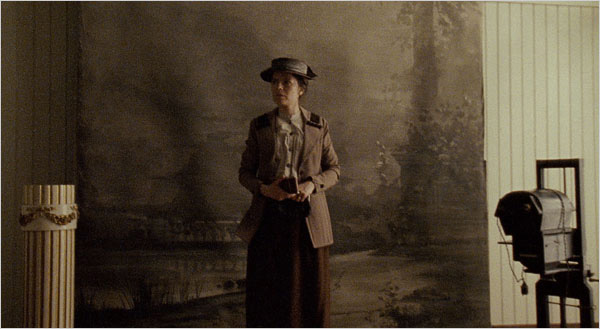
|  |  |  Entertainment | March 2009 Entertainment | March 2009  
With the World Changing Fast, Finding a Vision of Self in a Camera
 A. O. Scott - New York Times A. O. Scott - New York Times
go to original


| | Maria Heiskanen in Jan Troell’s “Everlasting Moments.” (IFC Films) |  |
Jan Troell’s “Everlasting Moments” is a film whose title gives a clue about the kind of mood it wants to create. Set in Sweden in the early decades of the 20th century, this movie unspools at a leisurely, episodic pace, dwelling on the details of domestic life with a care that is both naturalistic and nostalgic. From the start, a narrator’s voice establishes that this is a daughter’s reminiscence of her parents’ long, often painful marriage, and her wistful, elegiac recollections extend to the film’s visual texture, its brownish hues and grainy, wintry sunlight.

The meticulousness with which Mr. Troell attends to matters of illumination and composition (he shares the director of photography credit with Mischa Gavrjusjov) is especially apt given that the most important household object in “Everlasting Moments” is a camera. The narrator’s mother, a Finnish immigrant to Sweden named Maria Larsson (played with furious dignity by Maria Heiskanen), won it in a raffle before her marriage and decides to sell it during a time of crisis. Mr. Pedersen (Jesper Christensen), a kindly Danish fellow who runs the local photography studio, persuades Maria to keep the camera and encourages her in her vocation as a portraitist.

Maria’s husband, Sigfrid (Mikael Persbrandt), is far less supportive. A brawling, hard-drinking, womanizing brute — whose occasional flashes of decency, bravery and charm hardly compensate for his selfishness — Sigge, as he is known, is threatened by any self-assertion on his wife’s part. Preoccupied with caring for her children (there are at least a half dozen by the time the movie is over, including Maja, the narrator) and with maintaining the family’s respectability in a strait-laced and judgmental society, Maria at first seems like Sigge’s anchor and his foil. The film treats him, even at his worst, with compassion, and Mr. Persbrandt makes him magnetic as well as monstrous and pathetic.

But true sympathy, as well as young Maja’s daughterly loyalty, is reserved for Maria, whose heroism emerges over time, like a photographic image coaxed into clarity in the darkroom.

Quiet and decorous though it is, “Everlasting Moments” is as full of character and incident as a fat realist novel. Sigge is caught up in the drama of public events, from a violent longshoreman’s strike to the First World War, an adventure that turns out to be more a matter of pomp and revelry than of real danger or glory. It is Maria who takes account of more subtle changes going on around the family, including the arrival of cinema, a development that fills Sigge with violent and inexplicable rage.

There is sorrow and brutality in this film, but it is balanced by delicacy, humor and a sense of innocence that flirts with mawkishness. Any excursion into a lost world of childhood, whether it’s “Amarcord” or “The Secret Life of Bees,” risks sentimentalizing the past, but Mr. Troell, many of whose earlier films have also been historical dramas (most notably “The Emigrants” and “The New Land,” from the early ’70s), compensates with a sense of historical and psychological clarity. The result is an experience that, even as it feels a bit familiar, is nonetheless engrossing and satisfying.

EVERLASTING MOMENTS

Directed by Jan Troell; written by Niklas Radstrom, based on a story by Agneta Ulfsater Troell; directors of photography, Mr. Troell and Mischa Gavrjusjov; edited by Niels Pagh Andersen; music by Matti Bye; produced by Thomas Stenderup; released by IFC Films. In Swedish, with English subtitles. Running time: 2 hours 11 minutes. This film is not rated.

WITH: Maria Heiskanen (Maria Larsson), Mikael Persbrandt (Sigfrid Larsson), Jesper Christensen (Pedersen), Callin Ohrvall (Maja), Ghita Norby (Frk. Fagerdal), Amanda Ooms (Matilda), Emil Jensen (Englund) and Claire Wikholm (Karna). |

 |
|  |



